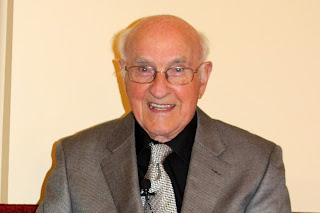The last Western heretic
Can a Christian remain true to her or his faith while rejecting the
resurrection of Jesus?
This Easter Christians around the world, including millions in
Indonesia, recognised their calendar’s high point. For many, worship at Easter identifies
commitment to their faith.
Professor Sir Lloyd Geering was among them for he’s a regular
churchgoer. But the New Zealand
theologian doesn’t accept any of the great tenets of the faith he follows,
virgin birth, the Holy Trinity and the Resurrection.
“My own theological journey through life has been one of continual
change and development,” he told a congregation celebrating his 70 years as an
ordained minister in the Presbyterian Church.
“I have slowly come to realise that there is no such thing as
unchangeable Christian truths.”
Such comments would result in banishment from many pulpits, even
charges of heresy. This is what happened
to Sir Lloyd in 1967 when he was accused of ‘doctrinal error.. and disturbing
the peace and unity of the church.’
Earlier he had written that the church had long misinterpreted the
resurrection story as resuscitation, and that the bones of Jesus still lie in
Palestine. Not surprisingly the reaction
was white hot.
The trial made media headlines around the world with Sir Lloyd
labelled as ‘the last Western heretic’.
The charges collapsed after the accused mounted a vigorous defence based
on his scholarship and reasoning.
Although Sir Lloyd has visited and lectured in several countries
it’s unlikely any church in Indonesia would welcome his presence, even though
the Archipelago is on the speaking circuit for overseas preachers, often from
the US.
These evangelicals draw thousands to big rallies. They don’t inspire Sir Lloyd who has been
outspoken in his hostility towards zealots of any faith.
“Fundamentalists are people who see
traditional religions being challenged and fear the change,” he said. “They
feel their own ways are under threat and react because they are too lazy to
think.”
Sir Lloyd said
he’d learned more from Buddhism than any other faith outside Christianity.
Buddhism had survived for 2,500 years without belief in God, and could point
the way to Christianity without God
He also paid
respect to Islam, saying that the faith in its early days, particularly in
Andalusia (a region in Southern Spain once controlled by Muslim Moors), had
contributed much to the world’s learning. This included mathematics, the West’s
numbering system, science and “a new burst of theology.”
“If it hadn’t
been for the contribution of Islam, Christianity might have died a natural
death,” he said. “Religions provide the time-tested frameworks of values. They
help us learn how to be human beings and live with one another.
“Diversity of
religions is a very good thing. What we’ve learned through ecology is that life
evolved because of diversity. As humans we are an unified organism, not
separate bodies.
“Religion must
be relevant to the times in which we live. Christianity in its classical form
had already died when I was a student – it was preached as a way of life.
Unfortunately ‘religion’ is a blocking word. It’s associated with the
supernatural.”
Attempts to find a bookstore in Indonesia’s major cities stocking
any of Sir Lloyd’s 16 books, including titles like Christianity without God
and In Praise of the Secular, was a doomed exercise.
Sir Lloyd, who has just turned 95, has been a widower twice. He was
knighted in 2009, remains physically spry and drives to St Andrews’s on The
Terrace, a Wellington Presbyterian church where he is the theologian in
residence and a regular speaker and debater.
The church supports same-sex marriage and gay and lesbian
clergy. It’s part of the Progressive
Christianity movement popular in the US and Australasia, though unlikely to
take root in Indonesia until criticism of religion is accepted and divorced
from atheism.
Although Christianity in Indonesia is reported to be expanding it
tends to be charismatic and conservative, with Protestant congregations
sometimes splitting and forming new denominations.
In Australasia congregations are shrinking and churches closing,
helping energize ecumenism. Doctrinal
differences matter less when the prayerful depart the pews.
Preachers from other faiths, including Islam, Judaism and Buddhism
have spoken at St Andrew’s and read their holy books at the lectern. An
Indonesian gamelan orchestra has played in the church.
Lloyd Geering was born in New Zealand’s South Island where Presbyterians
from Scotland first settled in the 19th century. His family was only mildly religious.
A brilliant mathematician he later turned to theology and became a
university lecturer in his homeland and Australia. He remains Emeritus Professor of Religious
Studies at the Victoria University of Wellington and is a drawcard for
theologians of all faiths from across the world.
Attitudes towards him have mellowed over the decades from
vilification as the most divisive man in the country to praise as the nation’s
leading public intellectual.
He is a member of the Jesus Seminar, a select group of largely
Western Biblical scholars that’s been re-examining and re-translating the
scriptures. They’ve been seeking what
they call the ‘historical Jesus’ as opposed to the figure constructed by later
contributors to the Bible.
Sir Lloyd’s lectures and preaching are intellectual exercises, not
happy clapping and calls to prayer, which he doesn’t support. He has made a
series of TV programs about his philosophy set in the Holy Land. He says he has no expectation of an
afterlife.
“The Biblical witness to the path of faith starts
with the story of Abraham, a figure who is equally honored in what later became
three great faith traditions - Judaism, Christianity and Islam,” he said.
“Like Abraham of old I am not at
all clear about the way ahead, either for the church or for the human race as a
whole.
“But I continue to go into the
unknown, walking the path of faith that started in his time and drawing my
values and inspiration from all who have followed in his steps.”
##


No comments:
Post a Comment